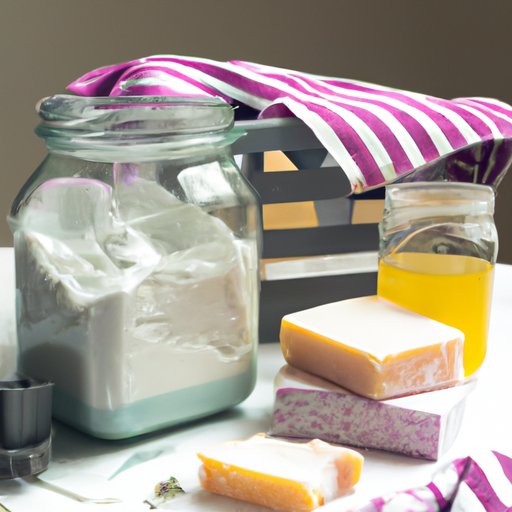Introduction
Making homemade laundry soap is a great way to save money and reduce your environmental impact. Commercial laundry detergents are expensive and often contain harsh chemicals that can harm the environment. By making your own natural laundry soap, you can create an inexpensive and eco-friendly alternative for your washing needs. In this article, we will provide a step-by-step guide on how to make your own homemade laundry soap.
Step-by-Step Guide: How to Make Homemade Laundry Soap
The first step in making your own laundry soap is to gather all of the necessary supplies. You will need one bar of natural, unscented soap, such as castile soap; washing soda; borax; and essential oils, if desired. Once you have gathered these items, you are ready to begin making your soap.
To make the soap, start by grating the bar of soap into a large bowl. Then, add two cups of washing soda and two cups of borax. Mix these ingredients together until they are well combined. If desired, you can also add a few drops of essential oil for fragrance. Once the ingredients are mixed, transfer the mixture to an airtight container and store it in a cool, dry place.
DIY Laundry Soap: An Easy, Cost-Effective Alternative
Making your own natural laundry soap is an easy and cost-effective alternative to commercial detergents. It is also much better for the environment, as many commercial detergents contain harsh chemicals that can pollute waterways and harm wildlife.
In addition to being more eco-friendly, homemade laundry soap is also much cheaper than store-bought detergents. On average, a batch of homemade laundry soap costs around $2 to make, compared to the $8 or more you would spend on a store-bought detergent. This makes homemade laundry soap a great option for those looking to save money on their laundry needs.

How to Create a Simple and Inexpensive Laundry Soap Recipe
Creating a simple and inexpensive laundry soap recipe is easy. All you need is one bar of natural, unscented soap, such as castile soap; two cups of washing soda; two cups of borax; and essential oils, if desired. Once you have gathered these items, simply grate the bar of soap into a bowl and mix in the washing soda and borax. If desired, add a few drops of essential oil for fragrance. Transfer the mixture to an airtight container and store it in a cool, dry place.
When using your homemade laundry soap, use about one tablespoon per load. For heavily soiled loads, you may want to increase the amount of soap used. Keep in mind that homemade laundry soap does not contain any artificial fragrances or brighteners, so your clothes may not be as bright as they would be with a store-bought detergent.
Save Money and the Environment by Making Your Own Laundry Soap
Making your own laundry soap is a great way to save money and reduce your environmental impact. Not only is it much cheaper than store-bought detergents, but it is also much better for the environment, as it does not contain any harsh chemicals that can pollute waterways and harm wildlife.
In addition to the financial and environmental benefits of making your own laundry soap, it is also a great way to avoid unnecessary waste. Commercial detergents come in single-use plastic containers, which can take hundreds of years to decompose. By making your own laundry soap, you can avoid adding these containers to landfills.
Conclusion
Making your own homemade laundry soap is a great way to save money and reduce your environmental impact. To make your own soap, simply gather one bar of natural, unscented soap; two cups of washing soda; two cups of borax; and essential oils, if desired. Grate the bar of soap into a bowl and mix in the washing soda and borax. Transfer the mixture to an airtight container and store it in a cool, dry place. Use approximately one tablespoon per load when using your homemade laundry soap.
By making your own laundry soap, you can save money and help protect the environment. Not only will you save money on detergent costs, but you will also be reducing your contribution to plastic waste and helping keep our waterways clean of harsh chemicals.


